A digital marketing course is a good entry point for anyone wanting a career in SEO or online marketing. It can help to provide a basic knowledge base as a starting point.
You can build many different specialized career paths, and if you’re just starting your career or seeking to understand digital marketing as a business owner, it’s good to get a general overview of the field first.
Of course, actively experimenting and getting experience is the best way to learn SEO and digital marketing.
The following digital marketing courses are listed alphabetically, not in order of quality or value. Each course will provide different benefits, so consider them carefully for your needs.
Free Digital Marketing Courses
Many businesses offer digital marketing courses as part of their digital strategies. If a company wishes to be seen as an expert in the field, offering courses makes sense to improve its reputation and acquire new clients.
These courses are great as a window into the most current digital marketing skills and trends. They’re often taught and developed by practicing experts. However, the quality can vary, so check the credentials and reviews.
1. Google Skillshop Fundamentals Of Digital Marketing
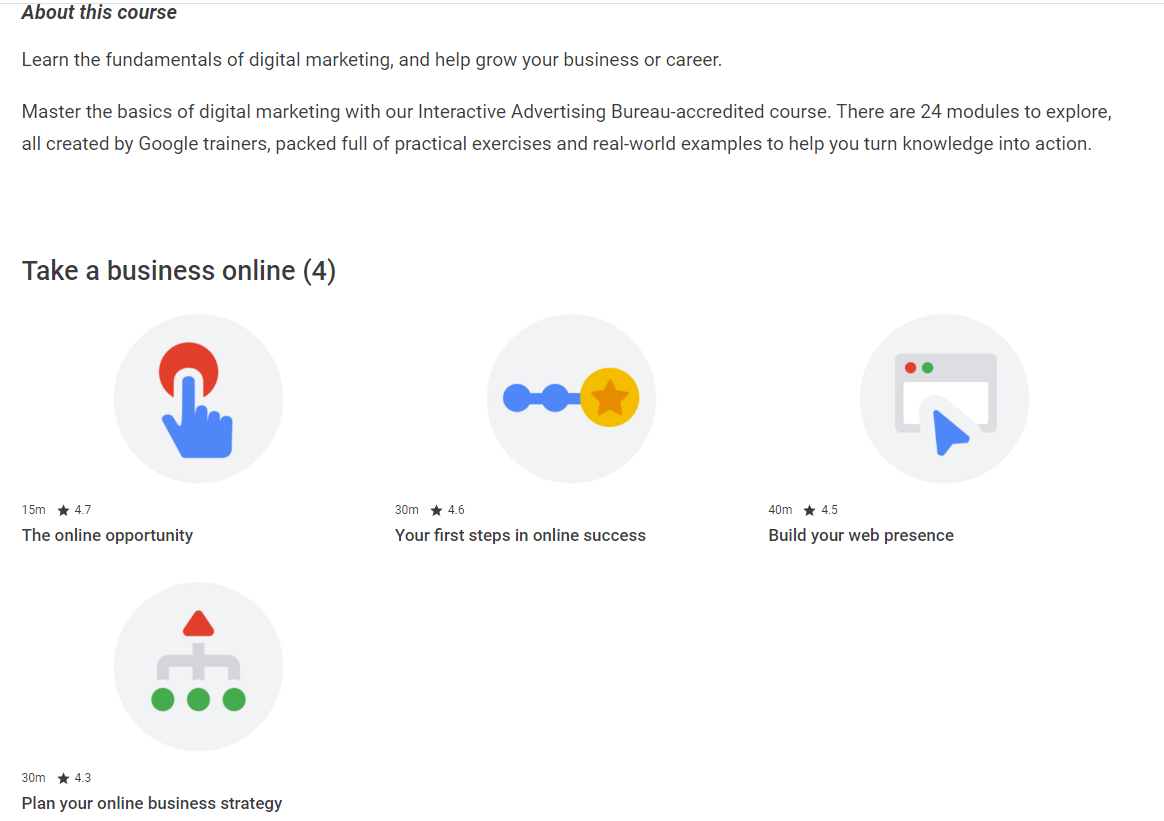 Screenshot from Google Skillshop, May 2024
Screenshot from Google Skillshop, May 2024Google is one of the leading digital companies. For many people, Google is the “face” of the internet and the first point of contact between humans and businesses online.
No matter how you feel about the vast control Google exerts over the internet and how business is done online, it’s one of the best places to start for general marketing knowledge.
The best things about the Skillshop is that it’s accessible, widely recognized, and contains refined content. There’s a lot to dig into, both in terms of digital marketing and Google tools.
Since you will likely encounter Google’s tools for managing websites, it’s a great place to start, and there’s a lot of content to continue your education in whichever way you need.
If you’re interested in search engine optimization or search engine marketing and ads, this is where you should start.
The fundamentals you learn in the Skillshop help you build a skill set around Google’s tools and services. You can also earn displayable certificates and awards when you complete the final assessments.
Experience Level
Key Learning
- Digital marketing fundamentals and basics.
- Step by step on how to take a business online.
- Search engine optimization and search advertising.
- Using Google’s tools.
Course Length
Course Features
- 24 individual modules.
- Introductions to important Google tools and search concepts.
- Quizzes after each module and a final assessment.
- Sharable award of completion.
2. HubSpot Academy Digital Marketing Course
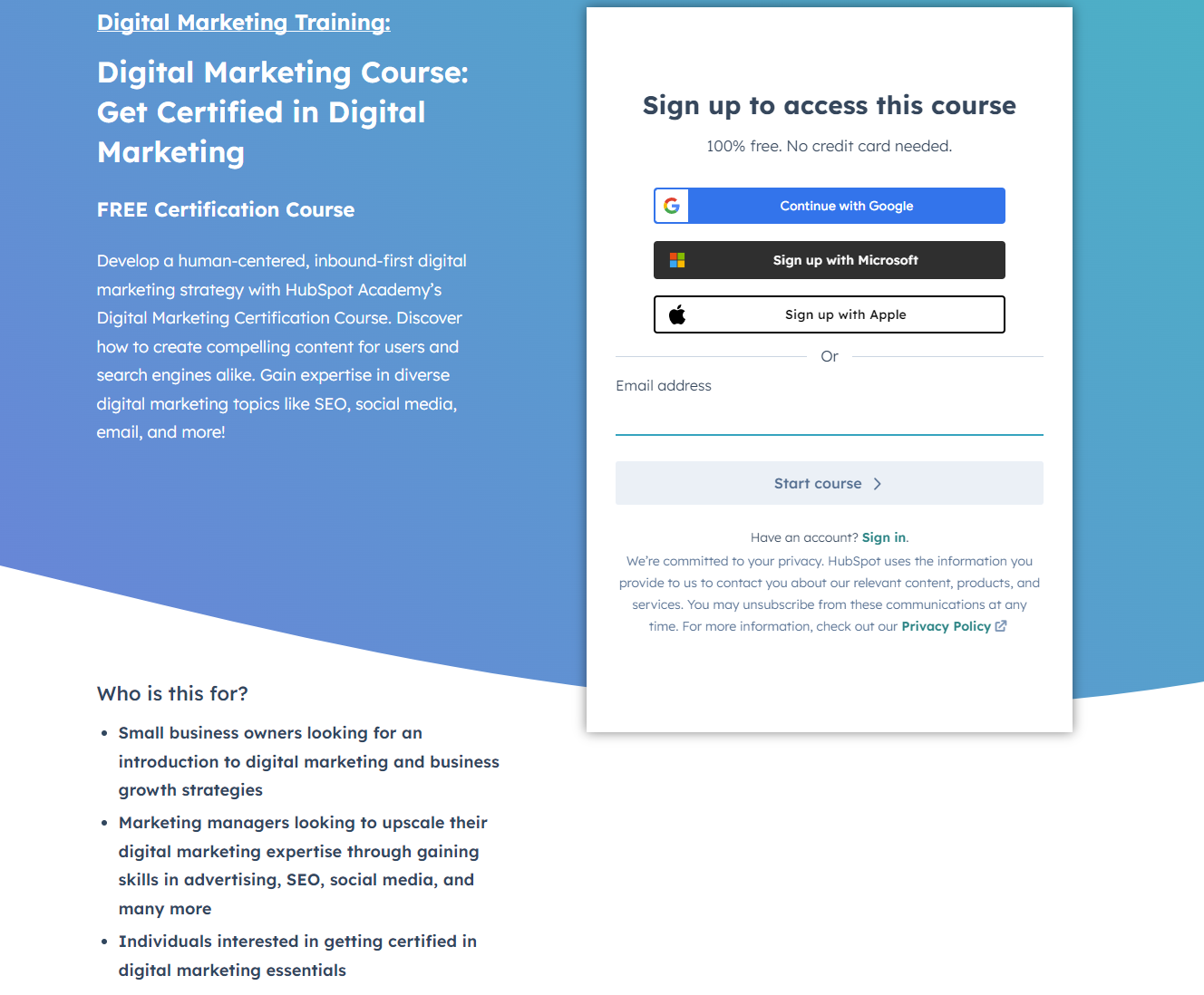 Screenshot from HubSpot, May 2024
Screenshot from HubSpot, May 2024HubSpot is another big name in digital marketing. It specializes in “inbound” marketing strategies, focusing on activities like customer relationship management and content strategy.
If you’re most interested in the inbound side of marketing, focused on understanding customers and improving how websites contributor to customer acquisition, then this is a great place to start.
Just like with Google, the courses are focused on HubSpot’s specific service areas.
This isn’t necessarily a bad thing; it’s where they have the most expertise to share. Once you have an account with the academy, HubSpot will give you personalized recommendations, which makes sense – personalization is its bread and butter.
By being part of its ecosystem, you’ll get a personalized learning experience. Paying attention to how it moves you through its lessons and content can also be a good lesson for you!
Watching how the pros move you through an inbound platform can be eye-opening if you pay close attention.
While this course is only a few hours long, the HubSpot Academy has many digital marketing courses. It’s a great way to build your own education and continue to gain skills throughout your career.
Experience
Key Learning
Course Length
Course Features
- Quizzes.
- Certification.
- Five languages: English, French, Japanese, Spanish, German.
3. Semrush Academy: Digital Advertising 101
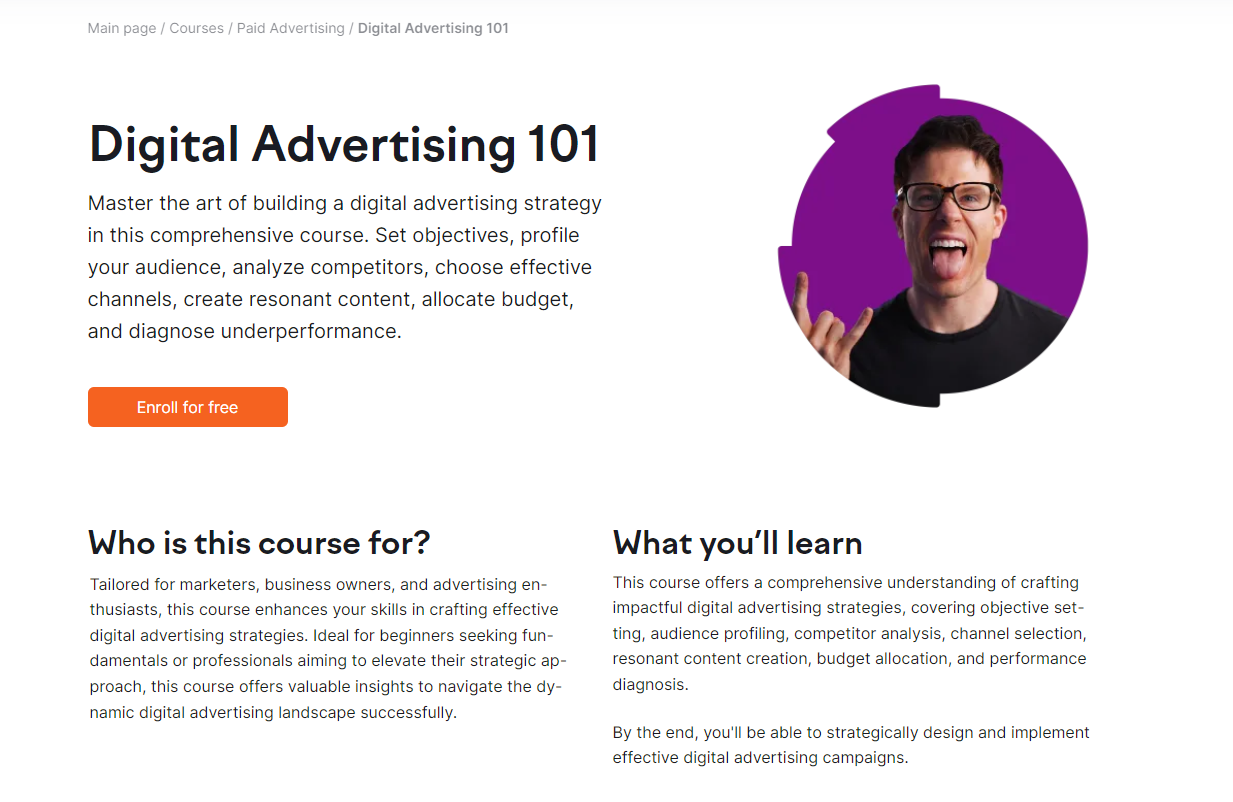 Screenshot from Semrush Academy, May 2024
Screenshot from Semrush Academy, May 2024Semrush is one of the biggest tool companies in the SEO space. If you’re interested in getting into SEO research and analytics, this course could be a good starting point.
You can expect this to be a focused course about devising strategies, planning and applying budgets, investigating competitors, and other data-driven activities.
However, the number of guest course instructors means that you can get insights from a variety of industry professionals in different roles and businesses.
Like with the other brand-offered courses, Semrush sticks to its core areas of business so you can expect courses that prepare you for marketing activities covered by its tools.
This, again, isn’t necessarily a bad thing. You’re very likely to encounter Semrush in your career if you choose to focus on SEO.
While this individual course is short, the Semrush Academy contains many courses from industry leaders such as Kevin Indig.
There’s lots to dig into, and the variety of expert course instructors is an excellent feature in favor of this option.
Experience
Key Learning
- Digital advertising strategies.
- Audience profiling.
- Competitor analysis.
- Channel selection.
- Budget allocation.
Course Length
Course Features
- Video course.
- Short and accessible.
- Certification.
- Jumping off point for more detailed courses in the Semrush Academy.
Paid Digital Marketing Courses
4. Digital Marketing Institute + American Marketing Association Professional Certificate
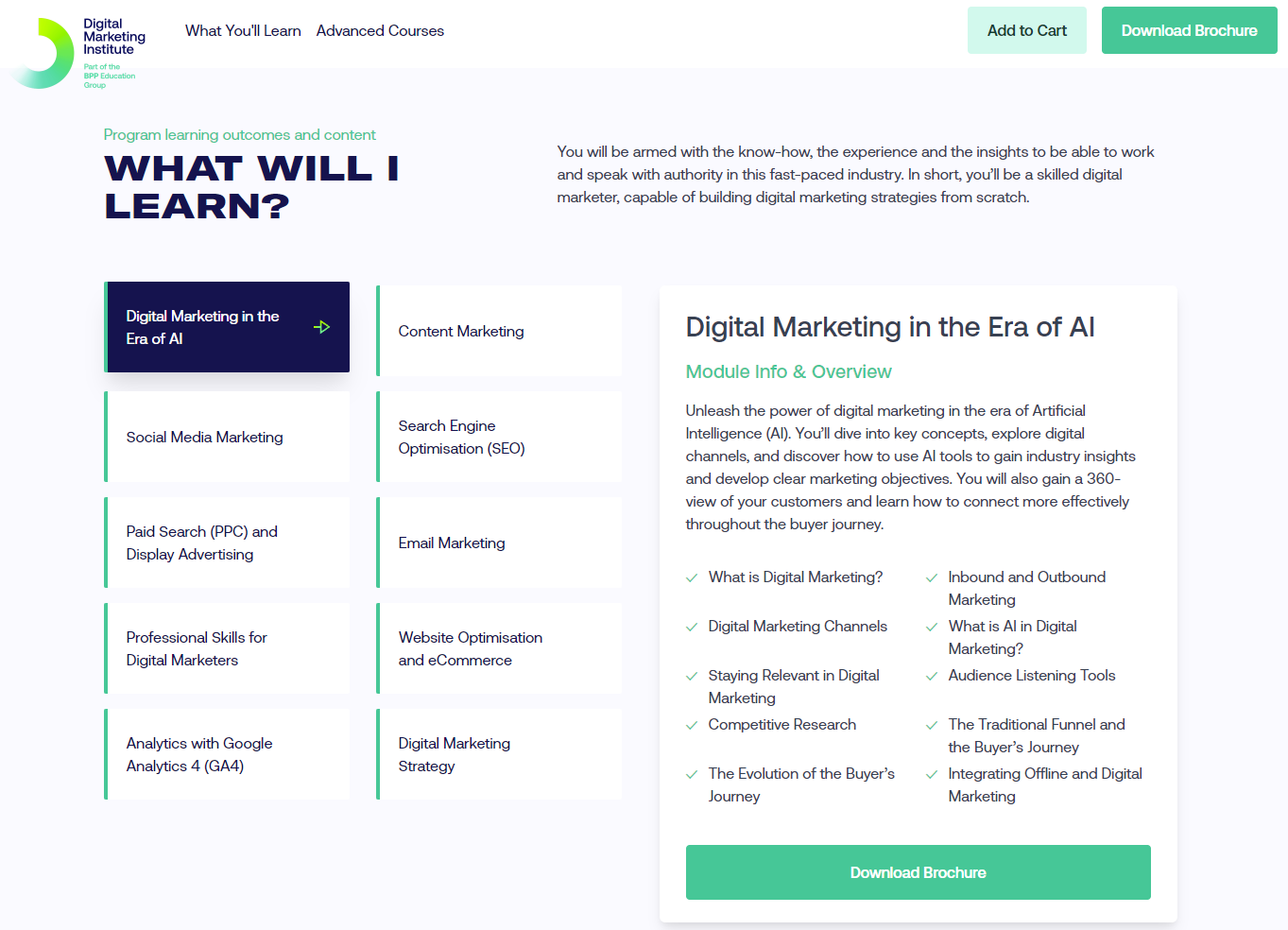 Screenshot from Digital Marketing Institute, May 2024
Screenshot from Digital Marketing Institute, May 2024Unlike the free courses offered by individual marketing companies, the courses from DMI and AMA will be more platform-inclusive and cover a broader range of topics.
You’ll explore modules focused on different tools and marketing activities, allowing you to learn about analytics, social media platforms, content, SEO, and AI.
This sets you up to make informed decisions about where you want to specialize as a marketer.
Companies offering paid courses have an incentive to keep up with current developments and trends, as you can see by the AI-focused module in the screenshot above.
Bear in mind that it’s unlikely a general marketing course will be on the bleeding edge of new technology. As things change, the course needs to be adjusted and re-released. This takes time.
Paid courses are, of course, a much bigger up-front investment. Deciding if they’re worth both the time and money can be difficult.
One of the best ways is to look for reviews and ongoing conversations about the course and the company that offers it. You could even start new conversations on social media platforms and ask other professionals what they think.
This way, you can get more information about the teaching styles, how assessments are conducted, and what people got from the experience.
It’s always best to do this research independently, outside of landing pages. Armed with the direct experiences of people who’ve taken the course, you can decide for yourself if it will fit your learning style and career goals.
Experience
- Beginner to intermediate.
Price
Key Learning
- AI.
- Content marketing.
- Social media marketing.
- SEO.
- Paid search and display advertising.
- Email marketing.
- Ecommerce.
- Analytics.
- Digital marketing strategy.
Course Features
- Two certifications.
- Multiple in-depth modules.
- Live webinars and Q&As.
- Practice exams.
- Recently updated with an AI-focused module.
5. Google Digital Marketing & Ecommerce Professional Certificate
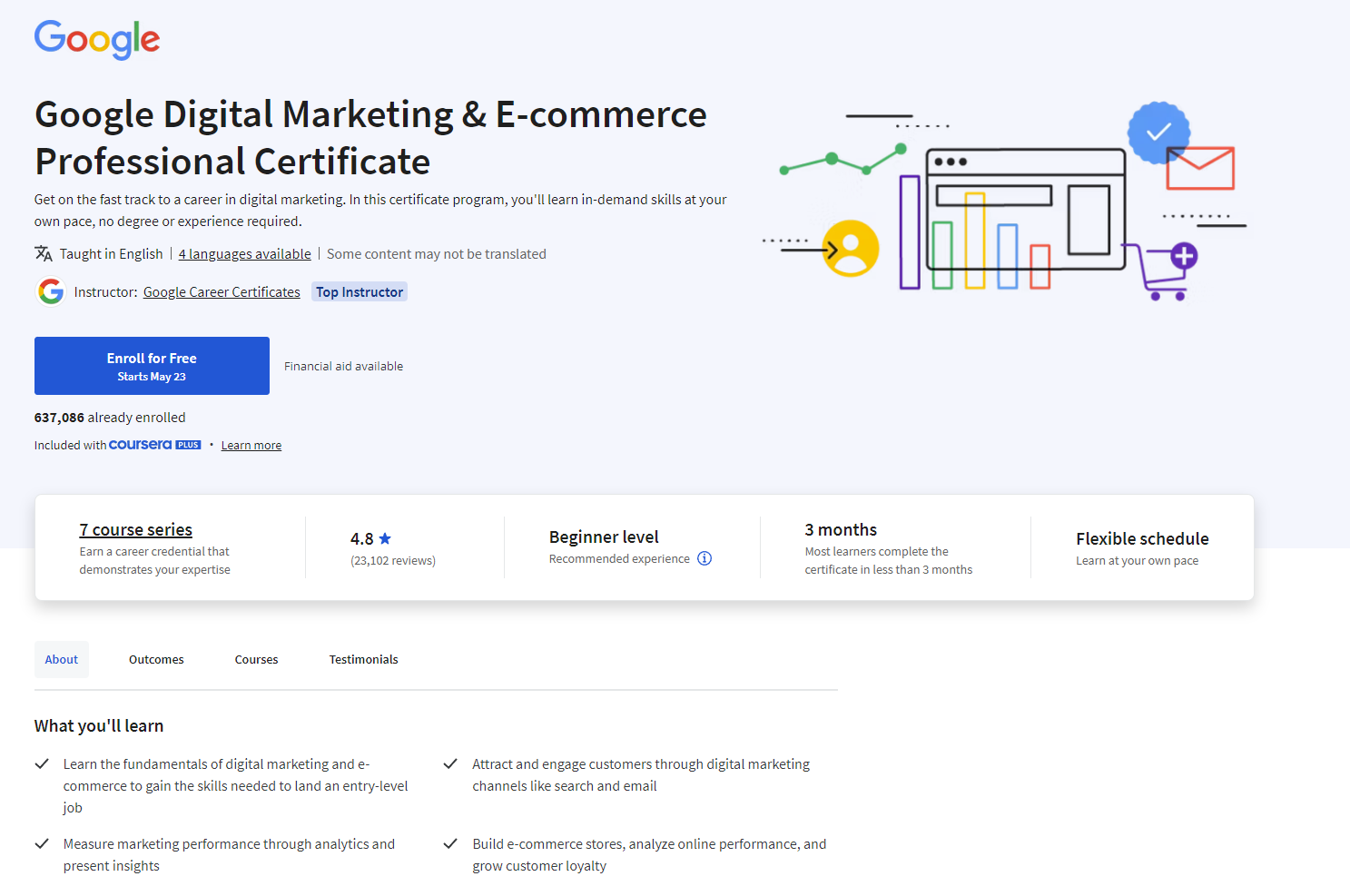 Screenshot from Coursera, May 2024
Screenshot from Coursera, May 2024Coursera is an interesting platform. You gain access to courses by paying a monthly fee. So while the courses are paid, you’re not putting a chunk of money down for one individual course. If you try one and don’t like it, then you can try something else.
Note that you can “enroll for free,” which begins a free trial. After the trial ends, you’ll be charged a subscription fee.
The course offered by Google is a great place to start if you’re trying out Coursera. It’s a long course series but still beginner-level. By the end of the free trial, you should know whether the course is worth it for you.
One thing to keep in mind is that the length of the course is not necessarily a selling point for a system designed to charge a monthly fee. Consistently assess the quality of the course and what you’re getting out of it.
Remember that it’s the learning that counts, not the certificate at the end. When you’re paying a subscription, you should avoid the sunk cost fallacy and pivot to new material if what you’re working on feels stale.
Remember to assess the price of the course by calculating the monthly fee against your actual completion rate. The site suggests a three-month completion time, which would cost $177, and would require just over 14 hours per week.
If you only had time for six hours per week, this course would take seven months and cost $413.
Experience
Price
- The “enroll for free” option begins a free trial period. After the 7-day free trial, the cost is $59 per month.
Key Learning
Course Length
- Seven courses.
- 18 to 29 hours per course.
- 170 total hours.
Course Features
- Professional training from Google.
- Certification.
- Career support.
6. Harvard Business School Online Digital Marketing Strategy
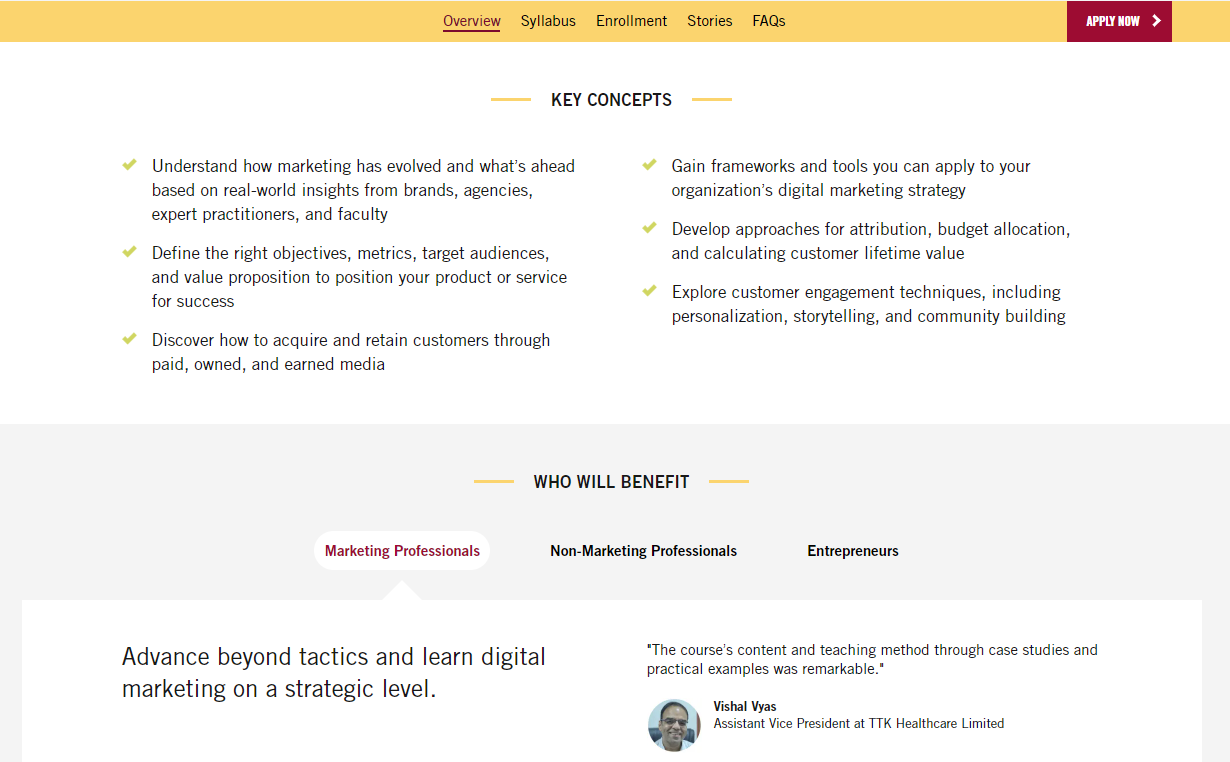 Screenshot from Harvard Business School Online, May 2024
Screenshot from Harvard Business School Online, May 2024Attaining a certification from an educational institution can boost your resume. The other benefit of a course like this is the learning environment.
If you struggle with learning things passively, a course offered by an educational institution is more likely to be prepared and taught by education professionals.
Education is a skill on its own. Courses like this, including faculty and practicing experts, can give you a better learning experience.
Educational institutions are also likely to have learning platforms and community functions to help support you while you learn. In terms of paying up-front for a course, the right educational institution could be a safe bet that you’ll get value out of the experience.
This course highlights practical examples, which tie any theory you learn to real-world situations.
One thing to be wary of is that educational institutions can adapt slowly to digital trends. The value of a course like this will heavily depend on the expert practitioners included.
One thing to note about this course is that it appears to be much more tightly planned than the six-month course we examined above. This isn’t a bad thing.
Concise planning and careful material selection can improve your learning experience, and the people who developed this course likely have experience developing syllabi.
Experience
- Beginner to intermediate.
Price
Key Learning
- Learn about metrics, objectives, target audiences, and value propositions.
- Paid, owned, and earned media.
- Digital marketing strategy.
- Attribution and calculating value.
Course Length
- Seven weeks.
- 6 to 7 hours per week.
Course Features
- Learn from real-world cases, brands, and business experts.
- Certificate of completion.
- Six modules.
- Community and networking group.
7. Meta Social Media Marketing Professional Certificate
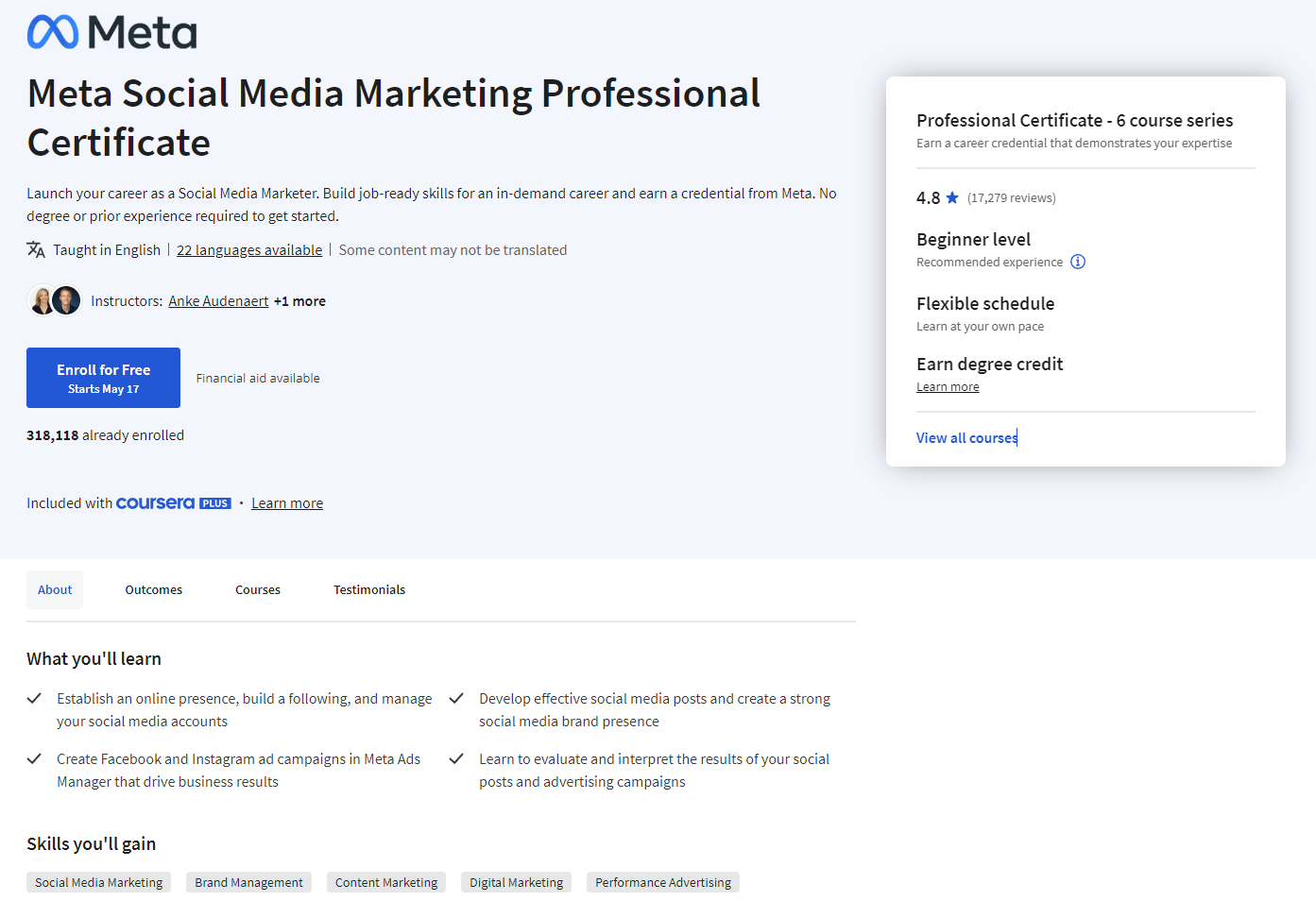 Screenshot from Coursera, May 2024
Screenshot from Coursera, May 2024This is another Coursera course, and so it comes with all the same notes we talked about with the Google Coursera course.
Run by Meta, this course focuses on social media, so you’re unlikely to get a broad overview of digital marketing as a whole. But you will get an overview of everything social media and brand management by one of the biggest brands in the industry.
Facebook has proven to be an incredibly enduring platform, and Meta owns other successful platforms and initiatives.
In addition to organic social media topics, you’ll learn about paid advertising. If you want to go into paid media, this would be a very helpful course for you as well.
Again, your mileage will vary depending on the time it takes you to complete the modules and how much time you have available per week.
Unfortunately, not all of this course’s modules give you time estimates. So, I would consider saving this one for after you have made a decision about whether Coursera as a platform is worth it for you.
Experience
Price
- The “enroll for free” option begins a free trial period. After the 7-day free trial, the cost is $59 per month.
Key Learning
- Social media marketing.
- Brand management.
- Content marketing.
- Social media paid advertising.
Course Length
- Six-course series.
- 10 to 20 hours per course.
- Not all courses have exact hour estimates.
Course Features
- Certification.
- 22 languages.
- Career resources upon completion.
- Degree credit eligible (earn credits toward degrees from participating institutions).
8. NYU Continuing Education: Digital Marketing
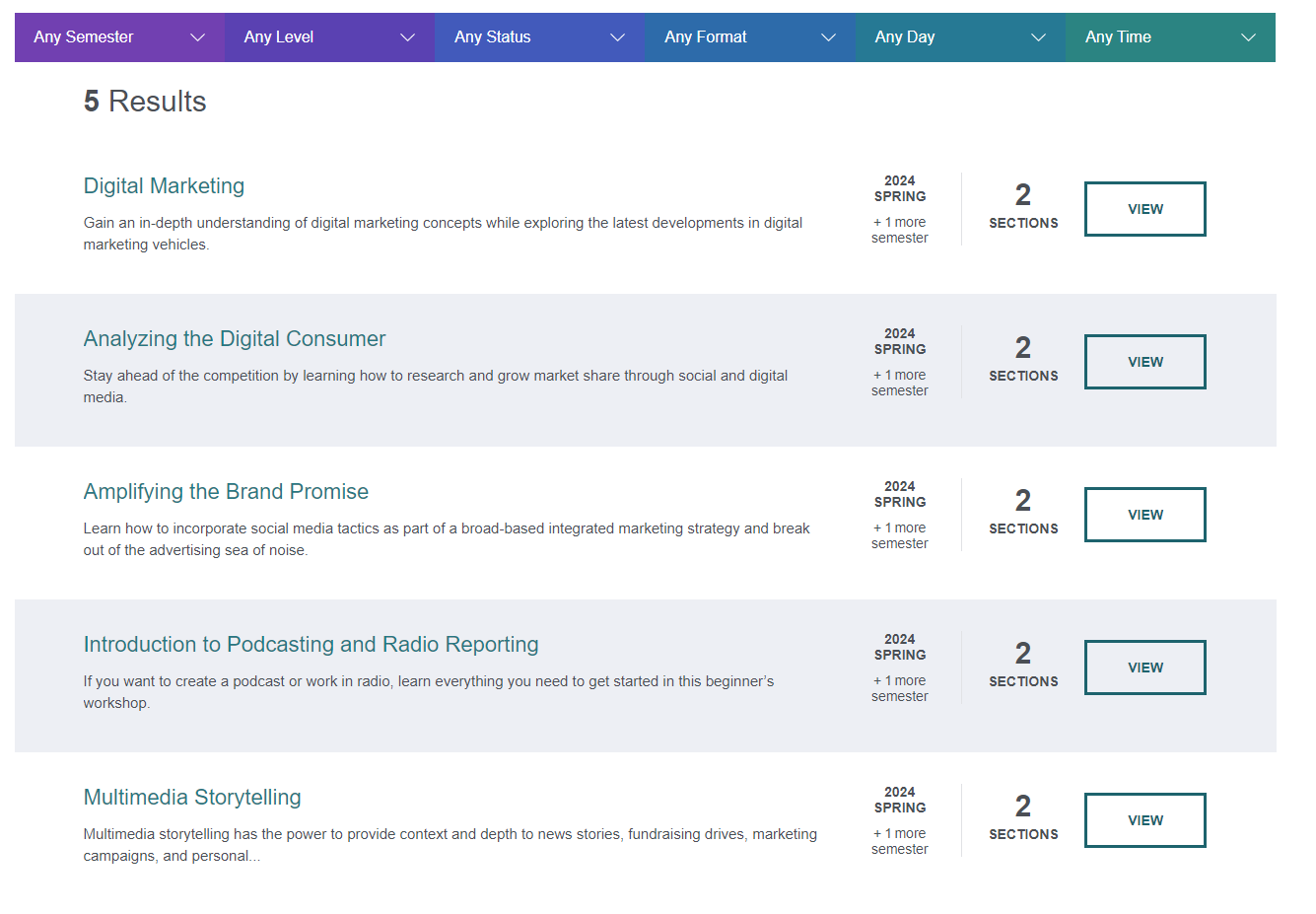 Screenshot from NYU Digital Marketing Course, May 2024
Screenshot from NYU Digital Marketing Course, May 2024Note: Courses fill up quickly, so you may need to wait for a new semester.
This course is very much structured like a traditional college course but with open enrollment.
More structured like a college course than the Harvard course above, you will get many of the benefits that come with formal education.
The courses are organized into sections with limited slots, which means they’ve planned for a certain number of learners and their needs. It’s going to be more interactive than a more free-form course taught with videos.
These courses are live and offered at specific times over the course of a semester. The benefits of this can be huge, as you’ll be participating in live lectures and learning.
You’ll have a community of other students to collaborate with, and your instructor may be available directly during certain times.
The disadvantage of this structure is that the course may not work with your schedule, and you won’t be able to learn at your own pace. This is a strict commitment if you want to make it worth the money.
Experience
- Beginner to intermediate.
Price
- $400 to $1,000 per course.
Key Learning
- Digital marketing strategies and tools.
- Audience development and consumer analysis.
- Branding.
- Multimedia marketing channels.
Course Length
- Each course is one semester long.
Course Features
- Five courses to choose from.
- Courses taught by professional faculty.
- College-caliber learning without having to commit to a degree.
9. Wharton University Of Pennsylvania Digital Marketing Certificate
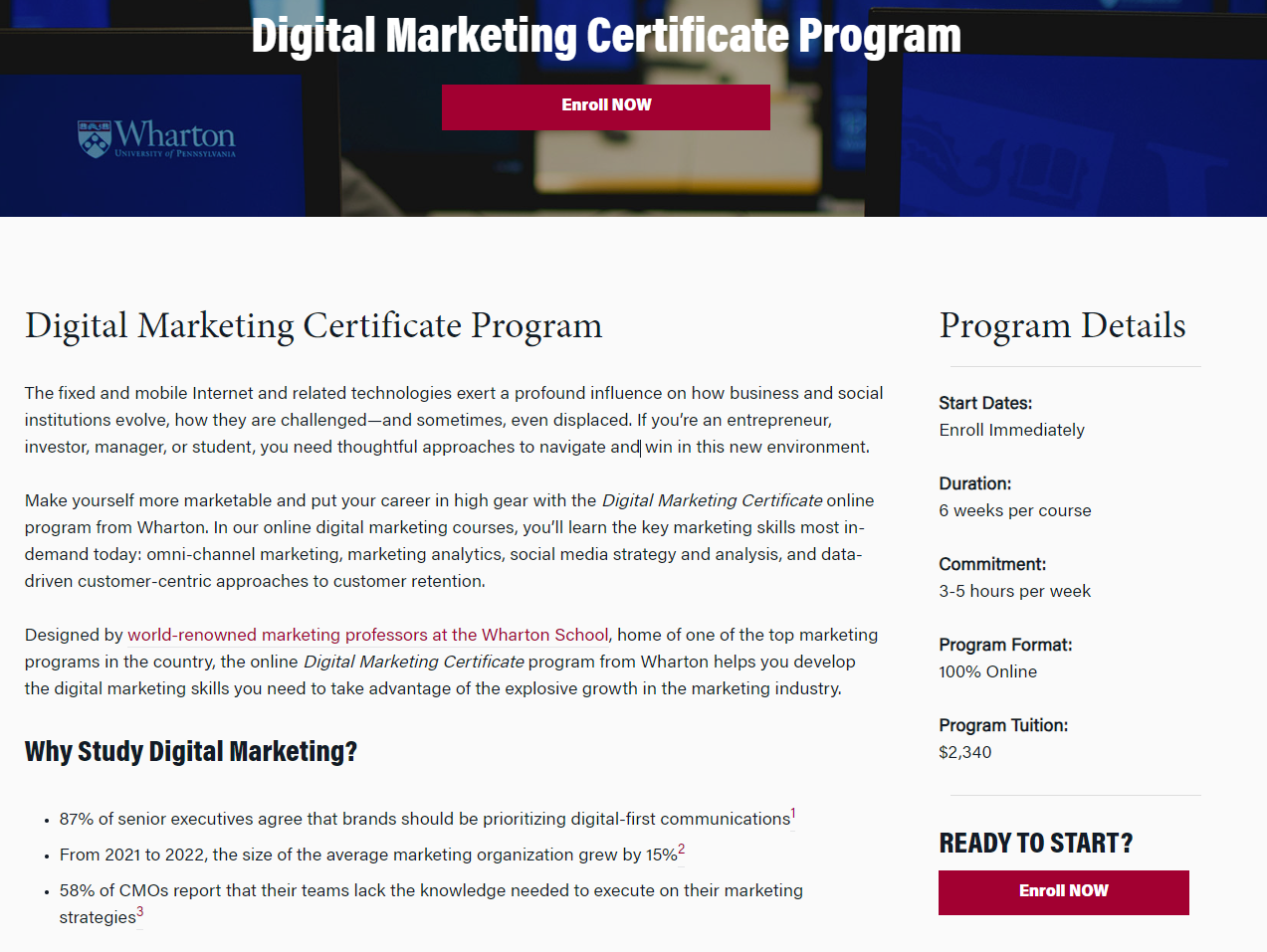 Screenshot from Wharton University, May 2024
Screenshot from Wharton University, May 2024The Wharton program is another course offered by a college that comes with a certificate. Getting a certificate at the end can be a draw for your resume if you don’t have much relevant or recent experience.
You can enroll in this course immediately, and it’s a small weekly time commitment, which makes it perfect if you’re already busy.
On the other hand, it’s quite expensive compared to the other courses on this list, and since it’s an on-demand course, you won’t have access to the same college-style benefits of the NYU courses.
This course focuses more heavily on business and business management than others in terms of content. This could be great if you need to brush up on your business fundamentals, but it may not be ideal if you have business chops and want to really focus on digital marketing.
It does prioritize analysis, and a course from a college with a strong business background will definitely be a good candidate for improving your data analysis skills. If you’re heading into a data-focused career, this course could be perfect.
Experience
- Beginner to intermediate.
Price
Key Learning
- Digital marketing fundamentals.
- Ecommerce.
- Metrics and metric analysis.
- Research and analysis.
Course Length
- Six weeks.
- 3 to 5 hours per week.
Course Features
- Four courses in the certificate program.
- Courses taught by professional faculty.
- College-caliber learning without having to commit to a degree.
- Certification.
10. UCLA Extension Digital Marketing Course
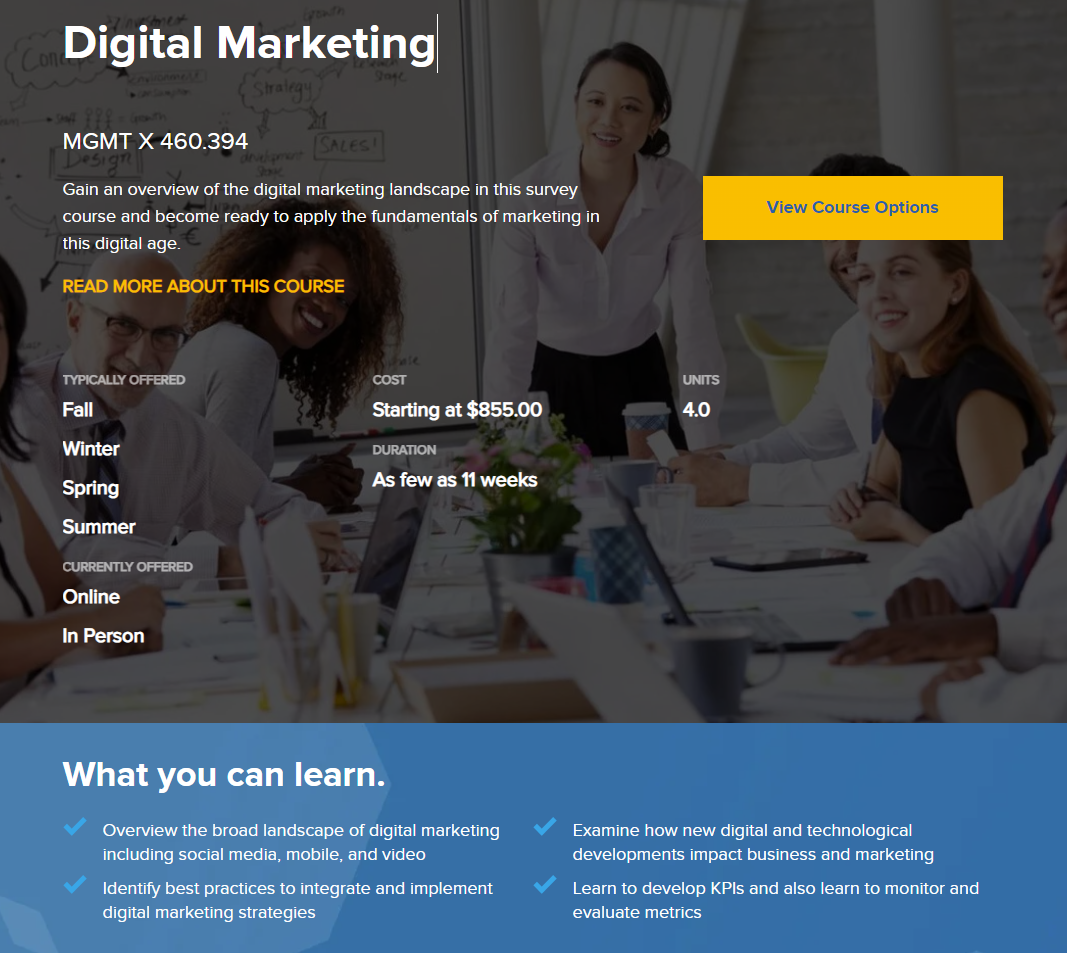 Screenshot from UCLA Extension, May 2024
Screenshot from UCLA Extension, May 2024Note: Make sure you’re applying for the online course if you can’t attend an in-person course.
Much like the NYU course, this is a more traditional college-level course. It is priced and organized consistently with other college-level courses. Don’t look at the price on this one and assume it’s not as valuable because it’s cheaper.
The online version of this course has no scheduled meeting times, which makes it slightly more accessible than the NYU course. But it’s still organized, very much like a college course.
It’s also taught by a marketing executive, so it’s another “best of both worlds” situation – college-level learning with the insights of an industry expert.
You can even check out the course syllabus at the bottom of the page to give you an idea of the content it will cover, as well as the books you’ll learn from.
While it doesn’t give you a breakdown of hours per week, you can get a very good sense of what you’ll learn over the course of the 11 weeks.
Experience
Price
Key Learning
- Digital marketing introduction and overview.
- Digital marketing strategy.
- Developing KPIs and monitoring metrics.
Course Length
Course Features
- Apply this course toward a certificate or specialization from UCLA.
- Four units.
- Courses taught by professional faculty.
- College-caliber learning without having to commit to a degree.
11. University Of Illinois Digital Marketing Specialization
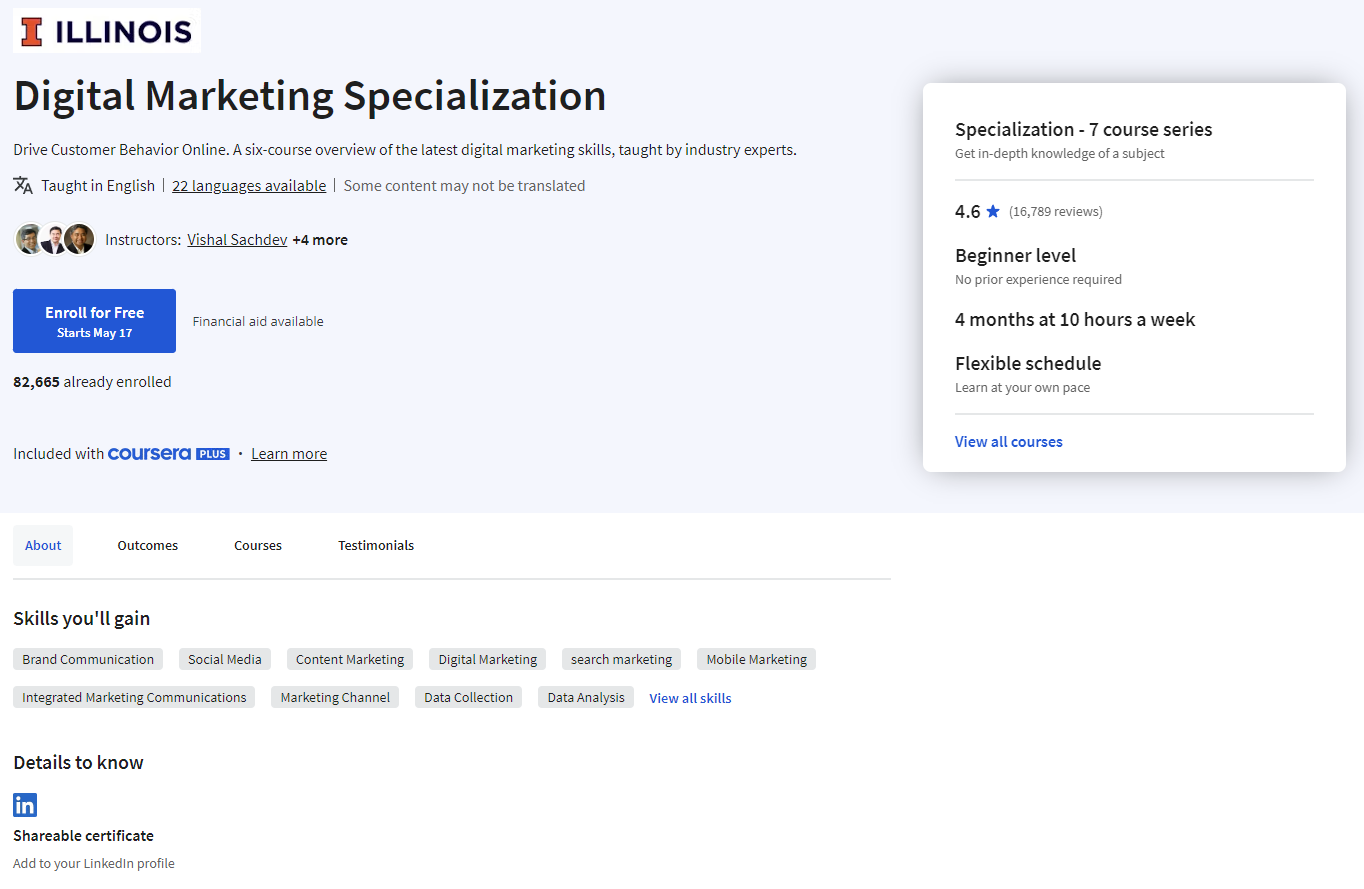 Screenshot from University of Illinois, May 2024
Screenshot from University of Illinois, May 2024To finish our list, we have a college offering a course through Coursera. Like the other Coursera courses, this is split into a series of sub-courses. Most of the sub-courses are in the 20-hour range.
Like the others, the actual “price” of this course will depend on your weekly availability and completion rate. With the four-month estimate, this costs $236. If you only do six hours per week, it will cost $354 and take six months.
This course series provides a robust overview of general concepts and is ideal if you are brand new to digital marketing or marketing in general. The first modules start from the beginning and take you through the inception and development of digital marketing.
If you view the series of courses, you can see that this series is planned methodically and that you will build knowledge and skills in an intuitive way.
First, it introduces analytics theory, and then the next module covers analytics in practice. This kind of organization will help you fully grasp the core concepts and then walk you through applying them in practice.
This course would be a great place for you to begin your journey, and it might even be worth it if you already know some of the more basic concepts for the way in which it organizes and presents the material.
Like the Google Coursera course, this would be a great candidate to spend your free trial on.
Experience
Price
- The “enroll for free” option begins a free trial period. After the 7-day free trial, the cost is $59 per month.
Key Learning
- Digital marketing basics.
- Planning and measuring digital marketing.
- Content marketing.
- Social media.
- Marketing channels.
- Data gathering and analysis.
Course Length
- Seven courses.
- 13 to 28 hours per course.
- 145 total hours.
Course Features
- Seven courses, including basic principles, data and analytics, and digital media.
- Certification.
- 22 languages available.
- Regular assessments.
Digital Marketing Courses FAQ
What Kind Of Digital Marketing Course Should I Take?
Digital marketing courses can help you learn the core concepts that you can apply to any specific skill set.
They are offered at various lengths – some with certifications, and some without. Some are offered by colleges with open enrollment.
The core factors you should consider are:
- What you’ll learn from the course: Is the description specific about what you’ll get from the experience?
- Price: Free courses can be high-quality, but they tend to be short and lack interactivity. Paid courses offered by colleges will likely have the most support and community.
- Certification and credit: Certifications can be helpful to share, but focus on the value the course offers to you first. Some courses can be used toward college credits, which is helpful if you are seeking a degree or professional certification from a college.
- Hands-on work and real-world examples: Courses that offer learning by doing and seeing theory in action can have much more value.
Why Digital Marketing Courses Matter
There’s a lot of information out there for free. With enough research, you could learn most of the theoretical concepts yourself without giving up your money or your data.
But this can be time-consuming, and self-guided learning isn’t always the best solution. It’s easy to get inaccurate information or hit roadblocks.
Courses, especially those led by professional educators, give you a structured environment, resources, and sometimes community.
The right course could be the best way to reach your goals.
More Digital Marketing Course Overviews From SEJ
Featured Image: Chay_Tee/Shutterstock
